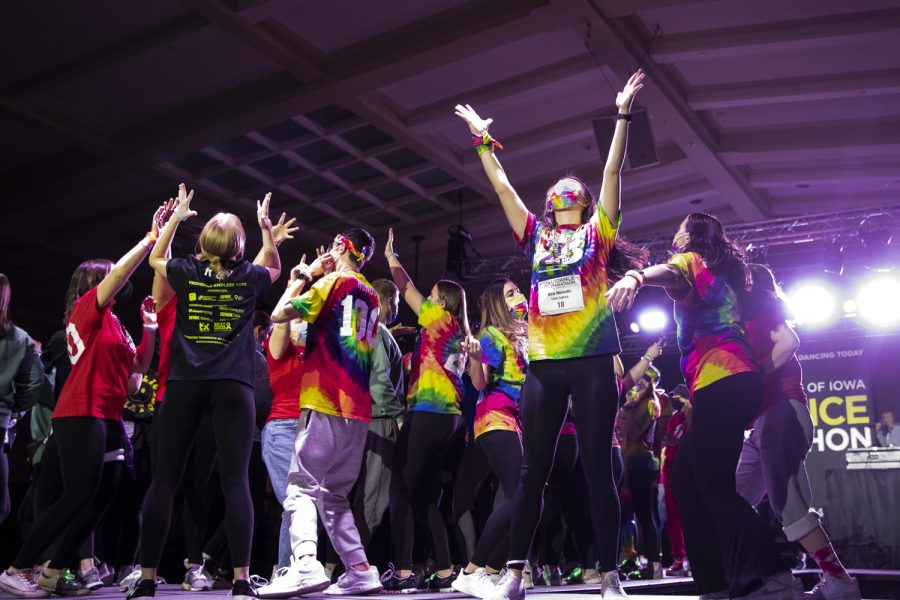2022 Dance Marathon works to increase accessibility through organizational changes
University of Iowa Dance Marathon executive director Raginya Handoo and her team promote accessibility with new initiatives of fee waivers, free registration day, and fundraising training.
Participants dance during Dance Marathon at the Iowa Memorial Union at in Iowa City on Saturday, Feb. 5, 2022. Last year’s event was held virtually with limited in-person participants.
November 14, 2022
Sitting opposite the rush of students at Catlett Market Place at 1 p.m. on Oct. 31, representatives of the University of Iowa 2022 Dance Marathon organization held a booth to promote its first-ever Free Registration Day.
The organization cut the fundraising minimum in half for participants — what is required to attend the Big Event in February — from $500 to $250, in addition to reducing registration fees from $50 to $25, UI Dance Marathon 2022 Executive Director Raginya Handoo said.
Handoo has been involved with Dance Marathon at UI for five years and has taken leadership roles throughout her time in the organization.
She was part of the team spearheading changes to the UI organization this year.
“To start off this year, we made really huge changes because we find even with recruitment and retention, asking somebody to pay $50 off the bat and then asking them to stay and fundraise $500 is a really big deterrent,” she said.
Among the representatives was UI senior Emily Jansen, who has been involved with Dance Marathon for four years.
“Usually, it’s a half-off registration day, but this year we’re doing free registration day,” Jansen said. “Registration this year in general has been half off. Usually, it’s $50. This year, it’s $25.”
Although Dance Marathon is a national organization part of the Children’s Miracle Network Hospitals with groups scattered throughout the U.S., directives for planning, fundraising, and registration fees are left up to the individual college group.
Madeline Wilson, UI second-year master’s student who joined the organization in January, said certain factors, such as the size of the university and the city and types of donors the group has connections to, can alter the mission, vision, fundraising goals, and registration fees of the group.
“I will say that we have found a lot of different strategies that have been successful for us this year,” Wilson said. “So tabling, peer-to-peer communication, going to other organizations that students are part of and encouraging their friends to sign up.”
Wilson said she thinks being personable and connecting with people allowed this year’s Dance Marathon participants to stay on track compared to last year’s numbers.
Handoo agrees that this year’s group, about 200 on the leadership team, is on track in terms of last year’s numbers.
“If we look back at our completely in person, like pre-COVID, our leadership team consists of about 300 people. I think last year we ran about 250 [people] maybe,” Handoo said.
In addition to directly asking people for money, Handoo said Dance Marathon utilizes other fundraising activities: community days with local businesses, art commissions, and tailgate shifts where dancers go around to different people and say they’re fundraising.
The UI Dance Marathon executive team has also introduced fundraising matching to alleviate the burden of fundraising.
“We as the leadership team and the directors acquire sponsors, and so what we do with some of that sponsorship money is give it to some of our dancers in terms of matching hours,” Handoo said, “so if you raise $10 this hour, it’s actually going to match and you’re actually getting $20 this hour.”
UI Dance Marathon isn’t alone in updating the practices of its program to be more accessible to students.
Grace Fangman, the executive director of Iowa State University Dance Marathon, said their program also implemented initiatives in the last few years to promote accessibility.
“We used to have a $250 minimum donation requirement for miracle makers to hit to be able to be a part of Dance Marathon,” Fangman said. “We changed two or three years ago. We lowered it to $100 and got rid of it being a requirement.”
Fangman said now the $100 is framed as a goal, and even those who don’t meet it are still allowed to go to the big event without any consequences.
“Prior to three years ago, it was if you didn’t hit your $250, they would charge you,” Fangman said. “They would charge your U-Bill. So, either way you’re still paying that $250.”
ISU Dance Marathon still has a $35 operational fee, but Fangman said that ISU Dance Marathon has a fee waiver to get it waived.
“So that’s been implemented in the last three years like gradually doing it little by little, and we’ve seen great outcomes, and most people end up raising over $100 anyways,” Fangman said.
UI Dance Marathon’s Big Event will take place Feb. 3-4, 2023 in the IMU.















